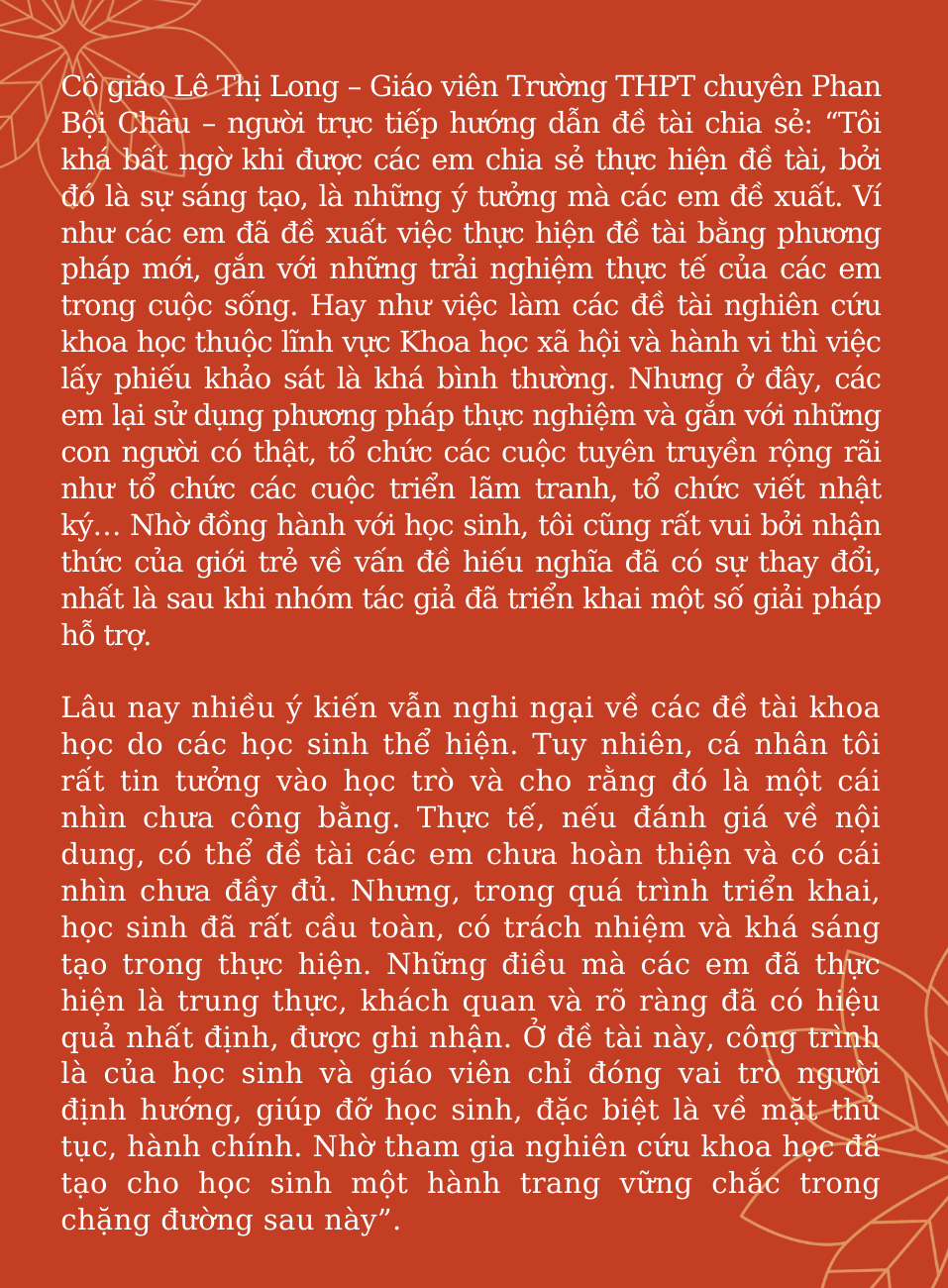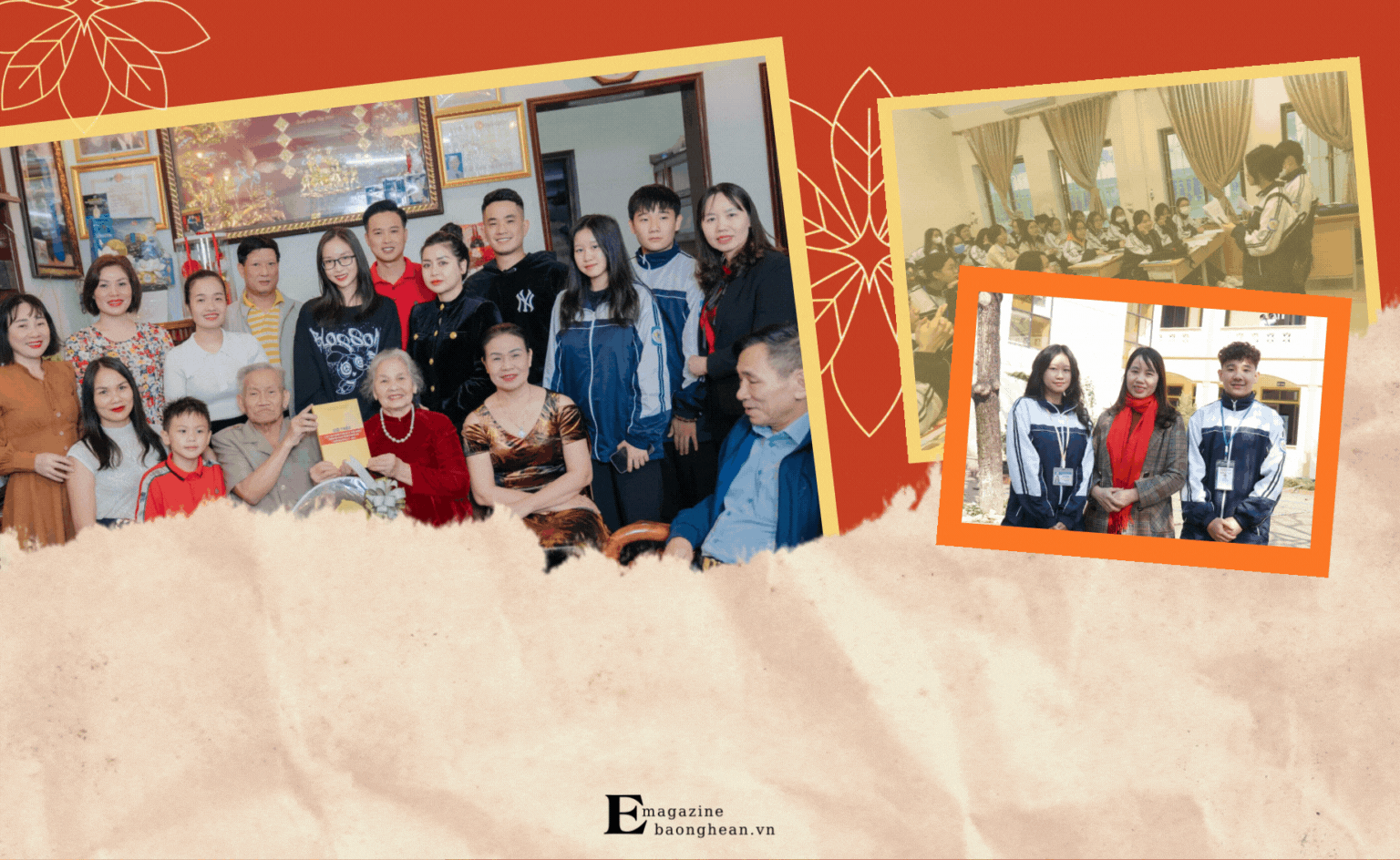
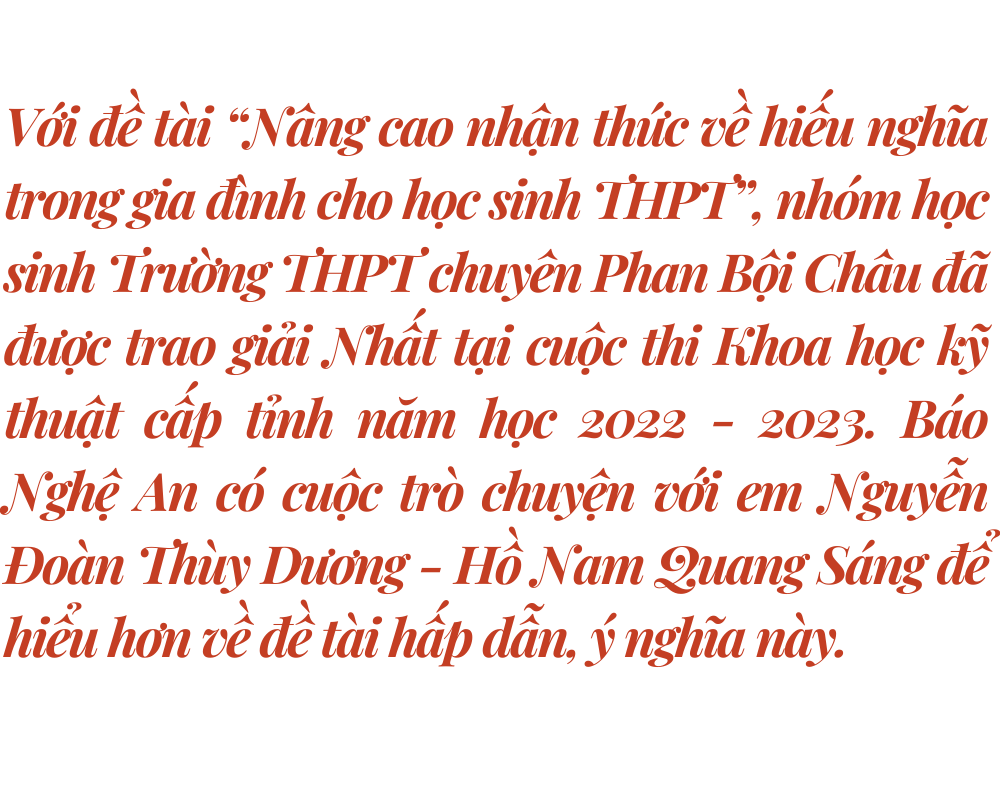
PV:Filial piety is not a new category and is not a "hot" issue for the generation of students born after 2000. Why did you choose this topic?
Nguyen Doan Thuy Duong:Filial piety is the source that everyone strives for and it seems that every other issue in life is related to filial piety and thanks to that, it helps people become better. This is also a fairly new topic in science and technology competitions. So more than a year ago, when I heard the story about "filial piety", I cherished this topic.
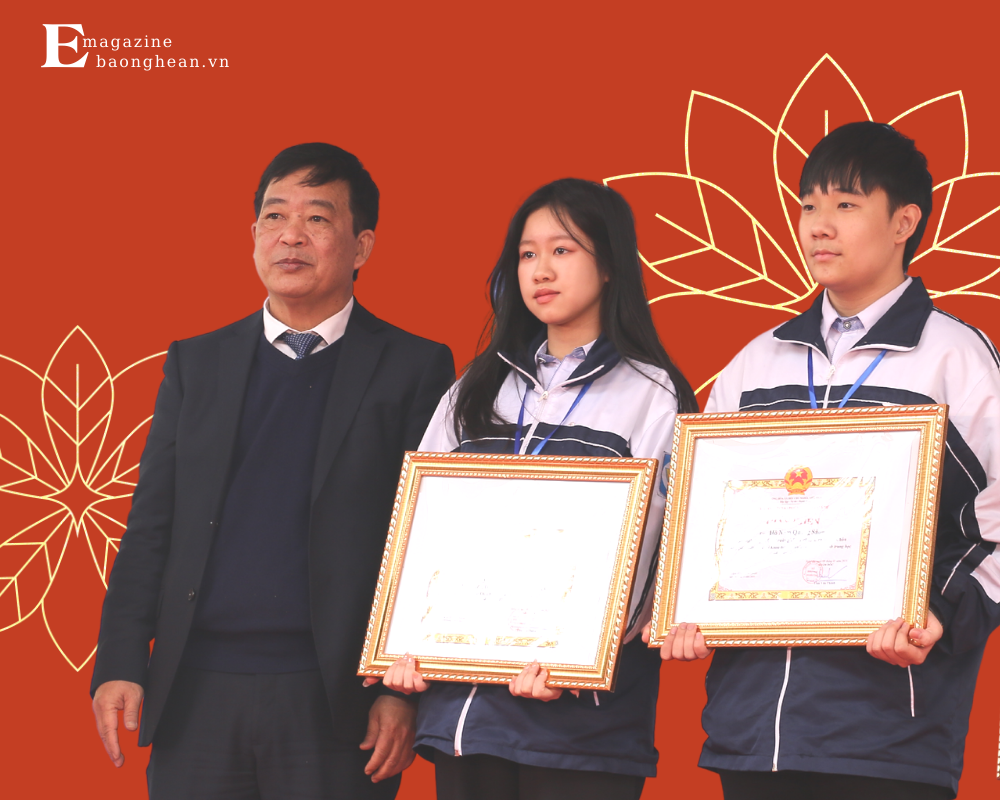
We also see that, every day in the mass media, it is easy to find stories and cases with disrespectful behavior of children towards their parents, including many cases involving high school students. This is a reality that needs to be studied and the causes and solutions found, contributing to the sustainable maintenance of the good cultural values of the nation.
Hunan Guangsheng:When I participated in this topic, I was quite hesitant because there are many categories of "filial piety". I researched online, went to the provincial library to read many documents and finally we decided to choose the topic "Building filial piety in the family and the relationship between parents and children". Indeed, for a long time we have talked a lot about filial piety and simply thought that children must be diligent, obedient, and listen to their parents... But, in reality, this is not always easy because there are inevitable disagreements. Therefore, since implementing the topic, I have read many stories about family behavior and sometimes I am "startled" by my own actions.
PV:I think that, looking at your topic, the judges will certainly be impressed with the process of collecting documents and developing content to evaluate the students' perspectives. So how can you connect with more than 2,000 high school students across the city to participate in this project?
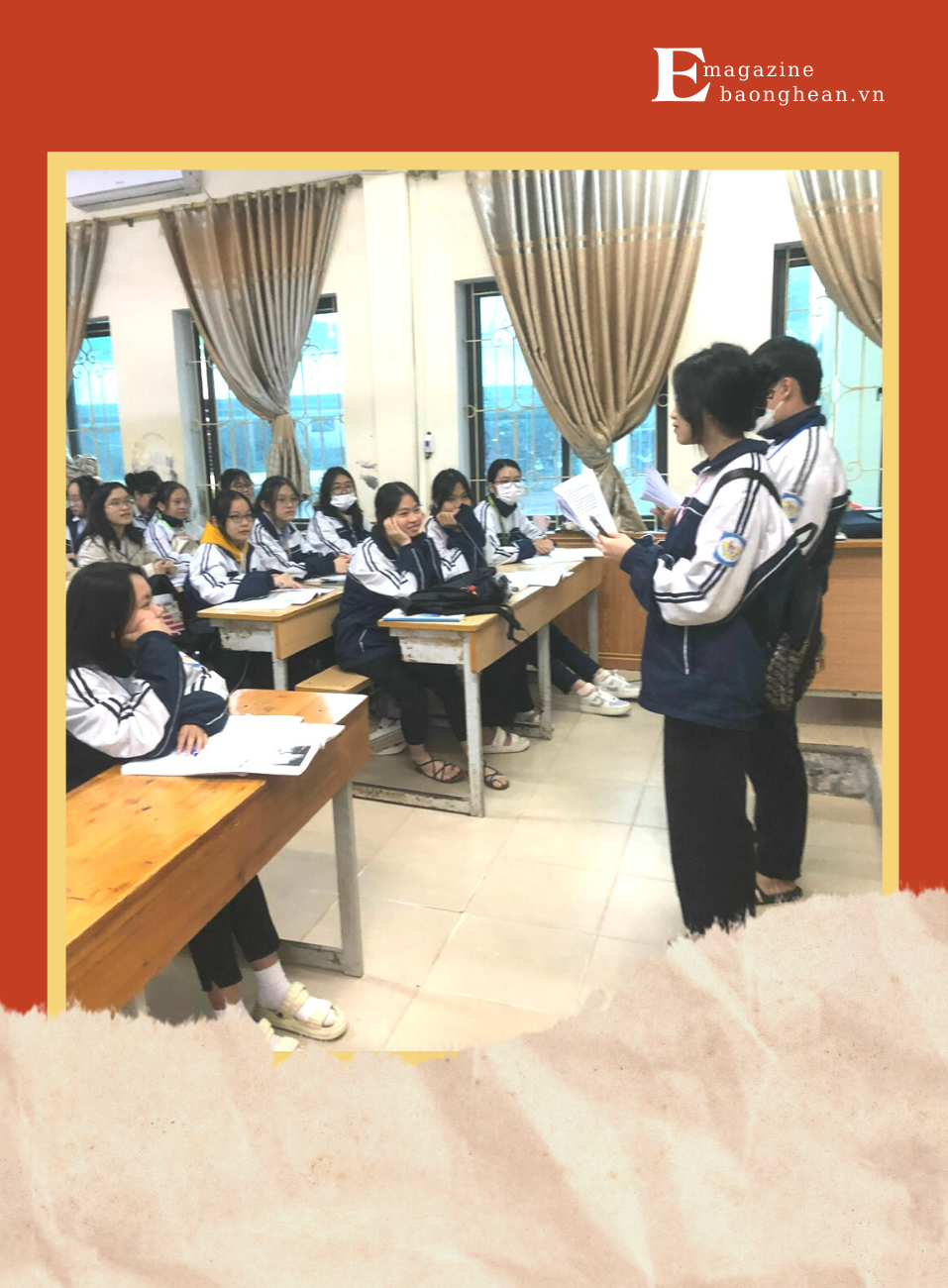
Hunan Guangsheng:To clarify the current situation and level of understanding of filial piety in the family of students in the research area, we used the question "How do you understand filial piety in the family" and distributed survey forms to 2,600 students at many high schools in the city such as: Phan Boi Chau High School for the Gifted, Le Viet Thuat High School, Huynh Thuc Khang High School. To do this, we went to each school and asked teachers to connect so we could reach the students. Although the work was quite hard, the results were quite good.
Nguyen Doan Thuy Duong:We had quite a few questions in the survey, such as, “Where did you get access to the content about filial piety in the family?”, “Which of the following criteria are suitable for filial piety in the family?”, “How do you react to your parents’ advice?”, “What time of day and for how long do you usually talk and confide in your parents?”… Along with that, we also conducted surveys for some parents and teachers at school to see how different the thinking is between generations. The results were also surprising. For example, with the question, if a relative is sick, what will you do? 78% of students chose to ask about their health; 56% of students know how to encourage and 22% of students said that they would take care of their relatives when they are sick. Unfortunately, there were still 290 students out of 2,636 surveyed students (accounting for 11%) who chose to do nothing when their relatives are sick.
In addition, the survey results also show that the level of implementation of behaviors such as asking, encouraging, and taking care of sick relatives of high school students in the research area is mainly at an irregular level of 1,898 students/2,636 students surveyed (accounting for 72%). Or when we asked the question, if parents had advice, how would students react, only 39% chose to listen and not react. Meanwhile, 22% chose not to listen and went elsewhere; 17% of students said that they had argued because they thought they were right. This shows that parents and students have not yet found a common voice, many students are not fully aware of filial piety and from there we are trying to find solutions to shorten this gap.
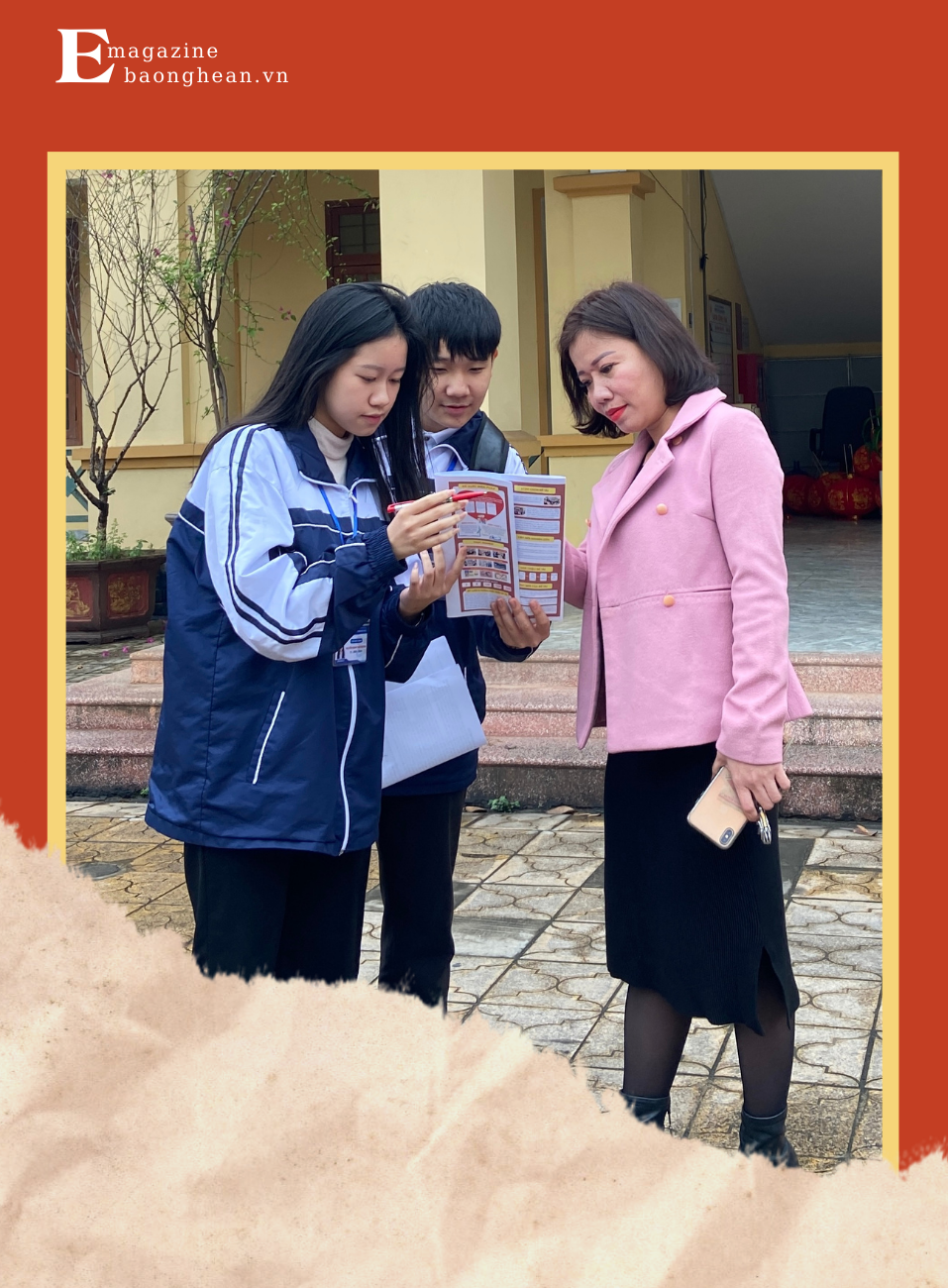
PV: You are talking about solutions. Is that when you implement some activities to support the topic such as organizing for students to participate in writing “Family Diary”, explaining the photo exhibition…
Nguyen Doan Thuy Duong:Regarding “Family Diary”, at first, only the group of authors, me and Sang, did it together. After that, I found it effective because every day we would record the tasks that we helped our parents with during the day and along with that were the comments from our parents. From our own diary, our classmates responded and then many students in other classes also participated and brought many meaningful things. Through each task we do during the day, we will see the things we do well, the things we have not done and more importantly, we receive the attention and encouragement of our parents.
Hunan Guangsheng:In fact, there are quite trivial stories in the diary, for example, a student wrote that today he washed the dishes but his parents said that "the dishes were not washed clean" and after reading it, we felt quite happy. But there are also stories that students can share thanks to the diary. For example, there was a 10th grade student who felt very sad because his test scores were not satisfactory and was scolded by his parents. But right after that, at the bottom of his diary, his parents also shared the reason for scolding their child. However, that was only "on the surface" because the essence was that parents wanted their children to try hard, wanted them to work hard so that they could see their children progress every day. In reality, it is very rare that parents can understand and share with each other every day, but thanks to "Family Diary" we seem to have shortened that distance. Like myself, I also blamed my parents, but later we realized that our parents are experienced people and their advice is drawn from their experience and love for their children. Therefore, children must be grateful and filial to their parents, instead of being heartless, only knowing how to play and care about other issues in society.
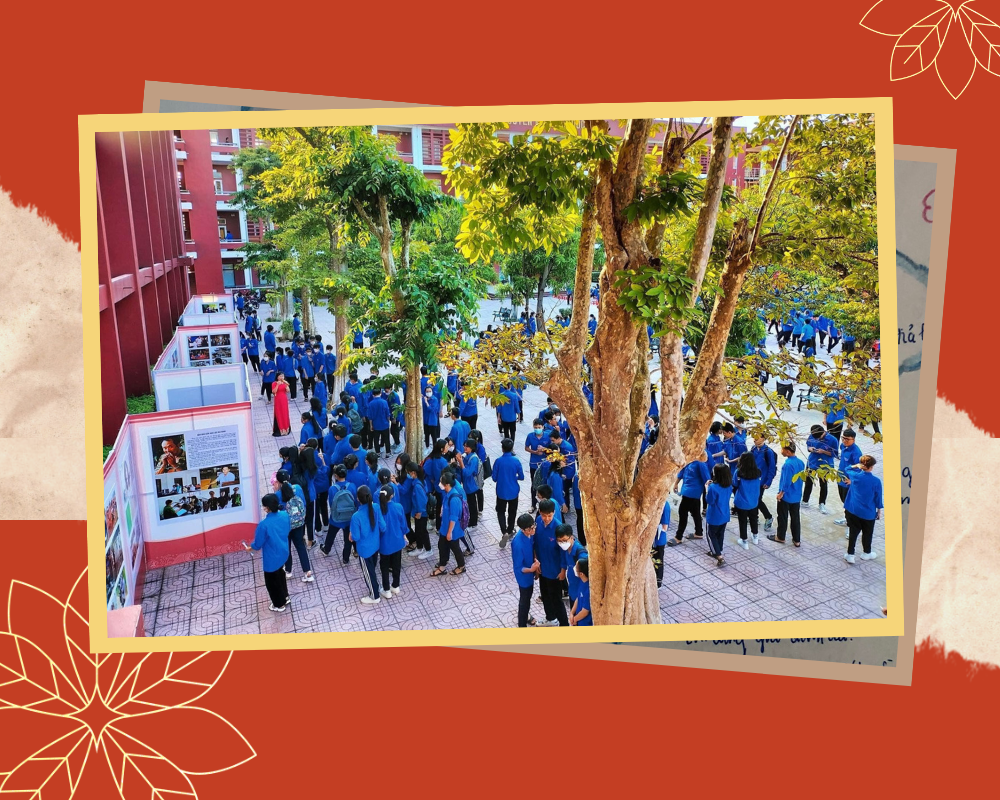
PV: At school age, doing a scientific research topic is certainly not easy. So for you, when two people study in two different classes, one majoring in Literature, the other majoring in History, how do you solve this problem? What is the biggest thing you have received after participating in the project?
Nguyen Doan Thuy Duong:That is inevitable and in fact, during the implementation process, we had many conflicts in implementing the problem's scope and implementation methods. However, since grade 9, I have participated in the provincial Science and Technology Competition and participated in the school's academic clubs, so I think I have some experience. But this is the first time I have participated in a large project with the presence of many students from other schools.
Hunan Guangsheng:Although there were some controversies, I learned a lot during the implementation process. In this project, there were many ideas to develop the topic that we boldly proposed and the teachers agreed. For example, we were supported by the Department of Culture and Sports to organize the "exhibition of paintings on the topic of filial piety" and participate in the presentation.

Organizing practical experiences with two typical cultural families is also very meaningful and we are very excited because we can directly listen to real people in our hometown, exchange and share with many generations, and be inspired by the achievements that the families have achieved. Also through this activity, we understand more about how to educate behavior from the family, the role of parents, and the responsibilities of children. From there, we have more understanding in terms of perception, knowing how to adjust behavior to suit filial piety in the family.
After this competition, although we were awarded the first prize by the jury, I think that is not the biggest reward. What we have achieved during the project is that we have gained a lot of experience and knowledge to be more responsible for our families.
The group of authors also hopes that the measures that are tested and proposed in the topic will contribute to equipping more knowledge and behavioral skills on appropriate filial piety in the family, contributing to preserving and promoting the noble moral values of the nation, especially moral values in the family.
PV: Thank you both for the conversation!
